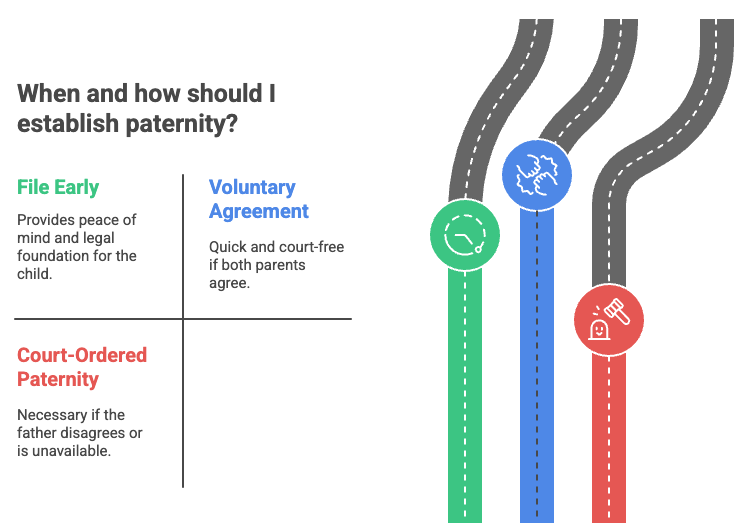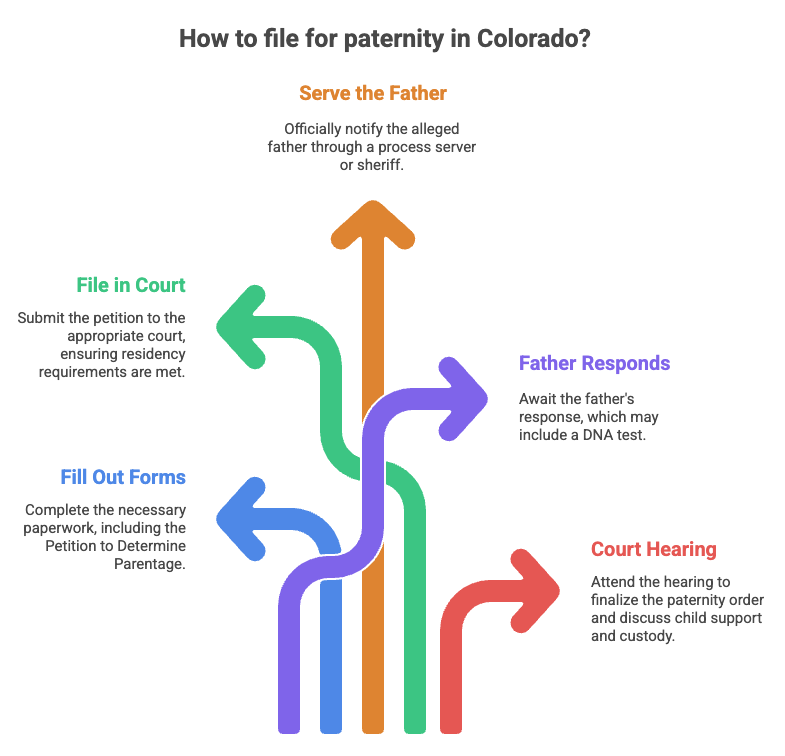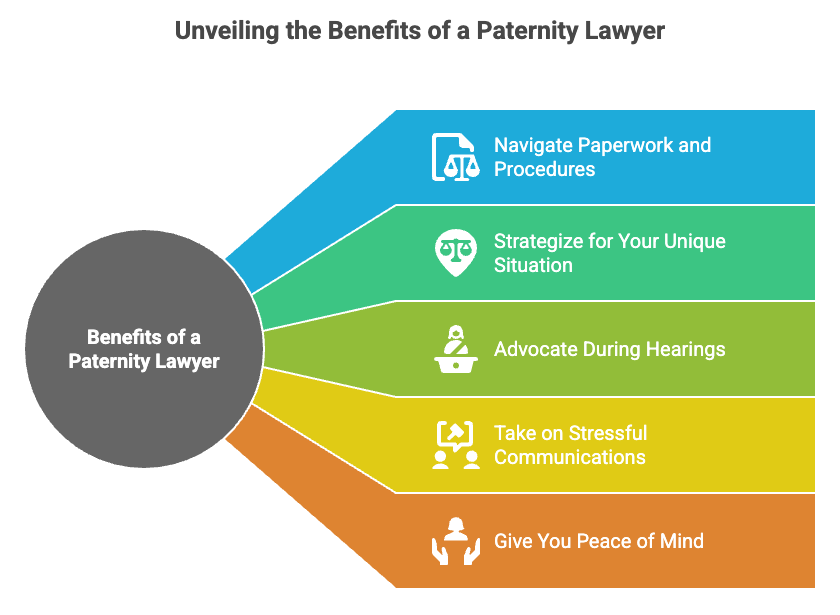- Why Does Establishing Paternity Matter for Colorado Moms?
- Getting Ready: What Every Denver Mom Should Know Before Filing
- Step-by-Step: How to File for Paternity in Colorado (Without Losing Your Mind)
- Child Support After Paternity: What Really Happens
- Protecting Your Rights, and Your Child's, Along the Way
- Why Work With a Denver Paternity Lawyer Focused on Mothers?
- Take the Next Step, For You and Your Child

Let’s be real for a moment, no one dreams of dealing with paternity paperwork when they become a parent. It’s emotional, sometimes confusing, and yes, a little intimidating. If you’re a mother in Denver or anywhere in Colorado looking to establish your child’s paternity, you’re not alone. At Jones Law Firm, our motto says it all: We Choose Sides. Yours.
We’ve walked this path with thousands of mothers over the years. Many of our clients admit, “I just want to do what’s best for my child, but I don’t even know where to start.” And you know what? That’s a brave and honest place to begin. So, let’s take the uncertainty out of the process and walk through it together.
Why Does Establishing Paternity Matter for Colorado Moms?
Ever had someone imply that “biological father” and “legal father” mean the same thing? Spoiler alert: In Colorado, they don’t. Legal paternity means the state officially recognizes a man as the child’s father, giving him rights and responsibilities. Until this happens, moms can’t get court-ordered child support, and dads can’t ask for parenting time. It’s a little more nuanced than Hallmark movies make it look!
What’s in It for You and Your Child?
Plain and simple, it’s about security and clarity:
- Financial Support: Once legal paternity is set, you can request child support. That’s huge for many moms.
- Medical Info: Ever filled out a doctor’s form and realized you have no clue about half your child’s medical history? Establishing paternity fixes that.
- Benefits & Inheritance: Your child may get access to health insurance, Social Security, or a future inheritance they’d otherwise miss out on.
And, at the end of the day, every child deserves the support of both parents, emotionally and financially.
Quick Anecdote
We once worked with Lisa, a single mom in Denver who put off filing for paternity for years, mainly due to nerves. When her son needed specialized medical care, not having the father’s history created unnecessary stress. If only she’d known how straightforward the legal process could be, she might have started sooner. (Spoiler: She did file eventually, and the relief on her face when it was done? Priceless.)
What About “Custody”?
In Colorado, you’ll hear a lot about “Allocation of Parental Responsibilities” (or APR). But heads up, none of that kicks in until paternity’s legally established. It’s literally the key that unlocks those doors.

Getting Ready: What Every Denver Mom Should Know Before Filing
Okay, let’s talk practical steps.
When Should You File for Paternity?
Here are some very common situations where a mom like you should consider filing:
- Dad isn’t on the birth certificate
- There’s no Voluntary Acknowledgement of Paternity signed
- The father’s denying (or is just unsure about) being the parent
- You need child support, or you want to make the father’s role “official” in the eyes of the law
Honestly, the earlier, the better. It brings peace of mind and sets up your child’s foundation, legally speaking.
The Legal Basics, But Simplified
Colorado law actually gives families more than one way to establish paternity:
- Voluntary Agreement: Both parents agree and sign a form (the Acknowledgement of Paternity, or AOP). This is quick and court-free.
- Court-Ordered Paternity: You file in court, usually if the father’s not agreeing or not available. (This is where we, as attorneys, really roll up our sleeves for you.)
And yes, you can initiate the case as the mother. It’s not just something dads do!

Step-by-Step: How to File for Paternity in Colorado (Without Losing Your Mind)
Let’s get down to brass tacks and talk about how to file for paternity in Denver, step by step.
Step 1: Fill Out the Forms
The adventure typically starts with the “Petition to Determine Parentage” (JDF 1501). Sounds formal, but don’t let the legalese intimidate you.
- You list yourself as the “Petitioner.” The father is the “Respondent.”
- Line by line, you’ll include info about yourself, your child, and the alleged father.
- Double-check everything, mistakes here just slow things down.
By the way, there’s a filing fee (about $238 at the time of writing), but if money’s tight, Colorado courts do allow fee waivers for qualifying folks. If in doubt, ask!
Step 2: File the Petition in the Right Court
You’ll usually file in the district court where either you or the alleged father lives. If you’re in Denver County, the Juvenile Court is your stop. The clerk can guide you (they see these cases all the time).
Heads up, either your child or you should have lived in Colorado for about six months (182 days) so the courts can handle your case.
Step 3: Serve the Father (Yes, “Service” Is Important!)
Lawyers talk about “service of process,” but all you really need to know is the father must be officially notified. Think sheriff, process server, or anyone over 18 who’s not involved in your case.
Why so formal? Until he’s legally served, the court can’t move forward. If you literally have no clue where he is, don’t stress, there are workarounds (like service by publication), but they get tricky. That’s when having a legal pro in your corner helps.
Step 4: The Father Responds, Sometimes With a DNA Test
Okay, here’s where it can get a bit dramatic (or not, depending on the dad’s response).
- If he says, “Yep, I’m the dad,” he can sign an “Admission of Parentage” (JDF 1504), and things can proceed smoothly.
- Not so sure, or flat-out denying it? The court will typically order a DNA test for you, your child, and the alleged dad. Don’t worry, it’s just a cheek swab, not like in TV crime shows.
95% of the time, folks find this part reassuring. Colorado only needs a 97% probability to legally establish paternity. Refusal to cooperate? The court can enter a default judgment.
Just a note: All this can take a few weeks to several months depending on how things go, especially if there are complications or if anyone’s dragging their feet.
Step 5: The Court Hearing and the Paternity Order
You made it! Once everything’s in, there’s usually a court hearing (sometimes it’s quick). If the judge agrees, they’ll issue a paternity order.
This is also when the court can address:
- Child Support Orders: Get ready to talk numbers.
- Custody & Parenting Time: If you want to sort that out now, you can.
If you and the father agree on a plan, it’s smooth sailing. If not, there might be additional hearings or mediation. (Yes, it sounds daunting, but you don’t have to go it alone.)

Child Support After Paternity: What Really Happens
Let’s be honest. For many moms, “child support after paternity in Colorado” is the burning question.
How Does Colorado Figure Out Child Support?
Short answer? With math. (But don’t let that scare you off.) Colorado uses something called the Income Shares Model. Here’s what goes into it:
- Both parents’ income
- Number of overnights the child spends with each parent
- Health insurance and daycare costs
- The goal: make sure your child gets about the same support they would if you and the father were under the same roof.
But, and this is key, child support doesn’t just happen automatically. It starts with a court order, which only happens after paternity is secured.
Did you know? Child support can be enforced through wage garnishment, license suspensions, and more if the father doesn’t pay up. There’s some muscle behind those orders!
Long-Term Benefits You Might Not Expect
Just by establishing paternity, you give your child potential access to benefits like:
- Health insurance via the father’s plan
- Social Security or veteran’s benefits (if the dad qualifies)
- A clear inheritance path
Honestly, those things can matter just as much as the monthly check.
Protecting Your Rights, and Your Child’s, Along the Way
So, what happens once paternity is set? Now the father has legal rights, too. That might be comforting, awkward, or even concerning, depending on your situation.
We understand that you might have mixed feelings here. If there are safety concerns (history of abuse, substance issues, etc.), let the court know right away. Colorado’s priority is always the child’s best interests, and the judges don’t just hand out unsupervised parenting time if there are legitimate concerns.
What Are “Best Interests of the Child” Factors Anyway?
Here’s what Colorado courts look at:
- Each parent’s ability to provide a stable, loving environment
- Any history of domestic violence or substance abuse
- The relationship that already exists between each parent and the child
- Special needs, medical requirements, and the general safety of the child
- The child’s own wishes (if they’re old enough to voice them)
It’s normal to worry: “If I file for paternity, am I inviting a headache if the father isn’t reliable?” That’s a totally valid question. My take? You’re not stirring up trouble, you’re making sure your child gets every right and protection they’re entitled to. And if things do get rocky, remember, you don’t have to handle tough negotiations, evidence collection, or courtroom conversations alone.
What If the Father Disagrees, or Wants More Than You’re Comfortable With?
Let’s face it, sometimes dads will contest paternity or threaten to “go after” custody in retaliation. If this happens, it helps (a lot) to have someone strategizing by your side.
A tip from the trenches: Document everything. Keep track of informal support he’s provided, your communications, any red flags, and who’s been the primary caregiver. This info isn’t just helpful, it can be crucial.
One mother we worked with, Maria, faced an uncooperative ex who threatened to drag her through court “just to make things hard.” With our guidance, she kept diligent records and stayed focused on protecting her daughter. In the end, her strategy, and her composure, made all the difference.
No matter how tense things get, you deserve support, clarity, and a strong advocate who knows the law and understands what’s at stake.
Why Work With a Denver Paternity Lawyer Focused on Mothers?
Sure, the law allows you to represent yourself. But when emotions are running high and your child’s security is on the line, teaming up with an experienced Denver paternity lawyer for mothers is often a smart move.
What Can a Jones Law Firm Attorney Actually Do for You?
- Navigate Paperwork and Procedures: We’ll handle the forms, technicalities, and ensure nothing slips through the cracks (you’d be amazed how often court filings bounce back over tiny mistakes).
- Strategize for Your Unique Situation: No two families, or fathers, are the same. We tailor everything to fit your circumstances and goals.
- Advocate During Hearings: Whether it’s fighting for fair support, supervised visitation, or making your concerns heard in a crowded courtroom, you won’t be standing there alone.
- Take on Stressful Communications: From talking to the other side’s lawyer to keeping the court on track, we handle the hard stuff so you can focus on your family.
- Give You Peace of Mind: Knowing you have a team that always chooses your side? That’s priceless.
Our approach? Bold where it counts. Compassionate always.
“Our firm blends commanding courtroom presence with unwavering empathy. We don’t just understand the law; we understand what’s at stake for you and your child.” – April D. Jones, Managing Attorney

Why Mothers in Denver Trust Jones Law Firm
With more than 25 years of focused family law experience and a 4.8/5 reputation across review sites, we’re known for delivering results with both heart and expertise.
Clients say things like:
“I was anxious about establishing paternity, but Jones Law Firm provided clarity at every step. Their expertise gave me peace of mind and secured vital support for my child.” – Jessica T., Google Review
“Jones Law Firm is hands down the best. They communicated every step, were swift with paperwork, and always put my child’s needs first.” – Shannon M., Avvo Review
We’re not here to just fill out forms. We’re here to be your command center, your advocate, your cheerleader, and, sometimes, the reassuring voice when things feel overwhelming.
Take the Next Step, For You and Your Child
We know this feels like a big leap. But here’s the bottom line: by establishing paternity, you’re setting your child up for the support, security, and recognition they deserve. And as your legal ally, Jones Law Firm is ready to back you every step of the way.
Remember, We Choose Sides. Yours. That’s not just our tagline, it’s our philosophy and our promise, from your first consult to the final order.
If you’re ready for clear answers, strategic support, and genuine peace of mind, let’s talk.
Contact us to schedule a confidential consultation. Take that first, empowering step to protect your family’s future, starting right now.
Jones Law Firm (Denver Divorce Attorneys): Strategic. Reliable. Empathetic.
This guide is for informational purposes and isn’t a substitute for one-on-one legal advice. Every family is different; let us help you find the best way forward.
Human insight, real experience, and a touch of Colorado heart, because your family truly does matter most.